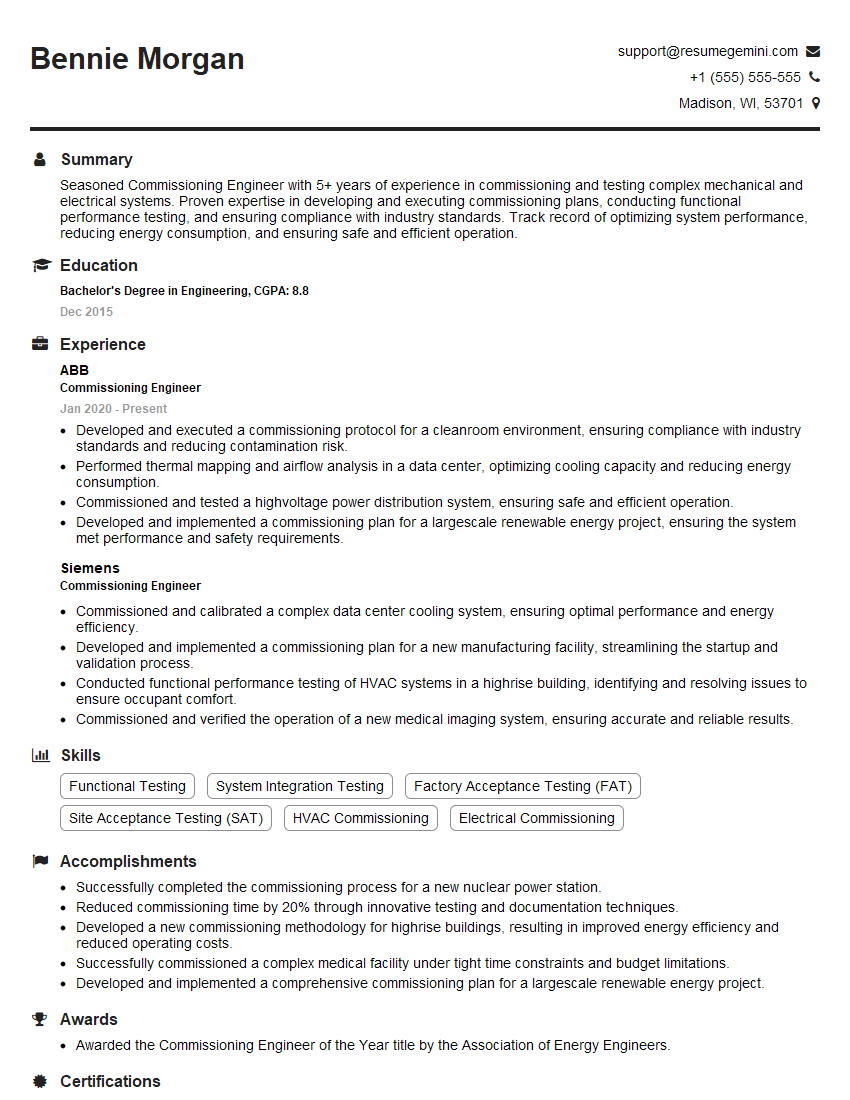Are you a seasoned Commissioning Engineer seeking a new career path? Discover our professionally built Commissioning Engineer Resume Template. This time-saving tool provides a solid foundation for your job search. Simply click “Edit Resume” to customize it with your unique experiences and achievements. Customize fonts and colors to match your personal style and increase your chances of landing your dream job. Explore more Resume Templates for additional options.

Bennie Morgan
Commissioning Engineer
Summary
Seasoned Commissioning Engineer with 5+ years of experience in commissioning and testing complex mechanical and electrical systems. Proven expertise in developing and executing commissioning plans, conducting functional performance testing, and ensuring compliance with industry standards. Track record of optimizing system performance, reducing energy consumption, and ensuring safe and efficient operation.
Education
Bachelor’s Degree in Engineering
December 2015
Skills
- Functional Testing
- System Integration Testing
- Factory Acceptance Testing (FAT)
- Site Acceptance Testing (SAT)
- HVAC Commissioning
- Electrical Commissioning
Work Experience
Commissioning Engineer
- Developed and executed a commissioning protocol for a cleanroom environment, ensuring compliance with industry standards and reducing contamination risk.
- Performed thermal mapping and airflow analysis in a data center, optimizing cooling capacity and reducing energy consumption.
- Commissioned and tested a highvoltage power distribution system, ensuring safe and efficient operation.
- Developed and implemented a commissioning plan for a largescale renewable energy project, ensuring the system met performance and safety requirements.
Commissioning Engineer
- Commissioned and calibrated a complex data center cooling system, ensuring optimal performance and energy efficiency.
- Developed and implemented a commissioning plan for a new manufacturing facility, streamlining the startup and validation process.
- Conducted functional performance testing of HVAC systems in a highrise building, identifying and resolving issues to ensure occupant comfort.
- Commissioned and verified the operation of a new medical imaging system, ensuring accurate and reliable results.
Accomplishments
- Successfully completed the commissioning process for a new nuclear power station.
- Reduced commissioning time by 20% through innovative testing and documentation techniques.
- Developed a new commissioning methodology for highrise buildings, resulting in improved energy efficiency and reduced operating costs.
- Successfully commissioned a complex medical facility under tight time constraints and budget limitations.
- Developed and implemented a comprehensive commissioning plan for a largescale renewable energy project.
Awards
- Awarded the Commissioning Engineer of the Year title by the Association of Energy Engineers.
Certificates
- Certified Commissioning Professional (CCP)
- Certified Testing and Balancing Technician (CTBT)
- Certified Energy Manager (CEM)
- LEED Green Associate
Career Expert Tips:
- Select the ideal resume template to showcase your professional experience effectively.
- Master the art of resume writing to highlight your unique qualifications and achievements.
- Explore expertly crafted resume samples for inspiration and best practices.
- Build your best resume for free this new year with ResumeGemini. Enjoy exclusive discounts on ATS optimized resume templates.
How To Write Resume For Commissioning Engineer
- Highlight your experience in commissioning complex systems and your understanding of industry standards.
- Quantify your accomplishments whenever possible, using specific metrics to demonstrate the impact of your work.
- Showcase your problem-solving and analytical skills by providing examples of how you resolved commissioning issues.
- Include relevant certifications, such as the Certified Commissioning Professional (CCP), to demonstrate your expertise.
Essential Experience Highlights for a Strong Commissioning Engineer Resume
- Develop and execute commissioning plans for new and existing facilities, ensuring adherence to design specifications and industry standards.
- Conduct functional performance testing of HVAC, electrical, and other mechanical systems to verify their performance and identify any issues.
- Commission and calibrate complex systems, such as data center cooling systems, medical imaging equipment, and renewable energy projects.
- Collaborate with design engineers, contractors, and end-users to resolve commissioning issues and ensure system optimization.
- Create and maintain commissioning documentation, including reports, checklists, and test results.
- Stay abreast of industry best practices and emerging technologies related to commissioning and testing.
- Provide technical support and training to operations and maintenance personnel on commissioned systems.
Frequently Asked Questions (FAQ’s) For Commissioning Engineer
What is the role of a Commissioning Engineer?
Commissioning Engineers ensure that newly installed or renovated buildings and systems perform as intended, meet design specifications, and operate safely and efficiently.
What industries require Commissioning Engineers?
Commissioning Engineers are employed in various industries, including healthcare, data centers, manufacturing, and commercial buildings.
What are the career prospects for Commissioning Engineers?
Commissioning Engineers with experience and expertise can advance to roles such as Commissioning Manager, Project Manager, or Director of Commissioning.
What skills are essential for a successful Commissioning Engineer?
Essential skills include technical knowledge of building systems, attention to detail, problem-solving abilities, and effective communication skills.
What qualifications are required to become a Commissioning Engineer?
A Bachelor’s degree in Engineering or a related field is typically required, along with experience in commissioning or related fields.
What is the average salary for a Commissioning Engineer?
The average salary for a Commissioning Engineer varies depending on experience, location, and industry, but generally ranges from $70,000 to $120,000 per year.
What are the benefits of hiring a Commissioning Engineer?
Hiring a Commissioning Engineer can help ensure that building systems are operating as intended, reduce energy consumption, and improve occupant comfort and safety.